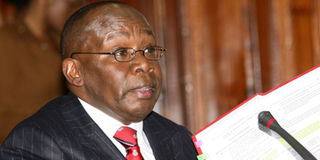Top court to handle round one poll cases

Attorney-General Githu Muigai. Photo/FILE
What you need to know:
- Judges say they will be ready to rule on disputes before the race is concluded
- The judges were giving their advisory opinion following an application by Attorney-General Githu Muigai arguing that the Constitution does not provide express right to bring an election petition over a dispute relating to first round of polls.
Presidential candidates or any individual dissatisfied with the outcome of the first round of the presidential election will have a chance to petition the Supreme Court for intervention.
However, this will derail the election and swearing in of a new President for over three months to allow the court to determine the case(s).
Whereas Article 140 of the Constitution only allows a petition challenging the presidential elections outcome after conclusion of the run-off, a full bench of the Supreme Court on Tuesday agreed that disputes are likely to arise after the first round, and which they will be ready to resolve.
The judges said what they need to come up with are strict timeline rules and guidance to ensure any petition is concluded before the date of the run-off.
According to the judges’ opinion, in the event of a second round of election, the words “within thirty days after the previous election” should be read to mean thirty days from the date on which disputes in respect of the first round will have been resolved.
“Within such guidelines, the Supreme Court— acting by its rule making powers under Article 163 (8) of the Constitution— would establish more specific and efficient timelines to guide the hearing of first round elections disputes,” ruled the judges.
The judges were giving their advisory opinion following an application by Attorney-General Githu Muigai arguing that the Constitution does not provide express right to bring an election petition over a dispute relating to first round of polls.
Chief Justice Willy Mutunga and Justices Jackton Ojwang’, Smokin Wanjala, Philip Tunoi and Njoki Ndung’u ruled that a presidential election, just like any other election, is not lodged in a single event but a process set in a plurality of stages.
They ruled that there should be no reason to presume that the framers of the Constitution intended that the court should exercise jurisdiction only in respect to disputes arising after the elections.




